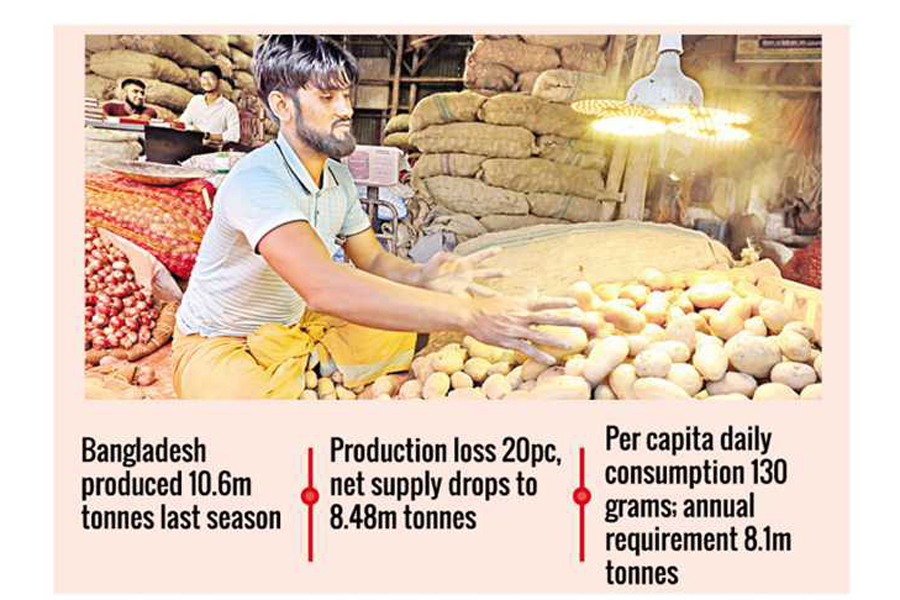
Published :
Updated :

Despite a surplus in potato production, retail prices in the domestic market continue to skyrocket, leaving consumers, especially those from lower-income brackets, struggling.
This persistent upward fluctuation raises concerns about the accuracy of population data used to estimate annual demand for the key agricultural product. It contributes to inflation as well.
Last season, Bangladesh produced 10.6 million tonnes of potatoes, making it the third most consumed agricultural product in the country.
However, after accounting for a 20-percent production loss, the net supply to the market drops to 8.48 million tonnes.
Given the highest estimated per capita daily consumption of 130-gram, the national annual requirement stands at approximately 8.1 million tonnes, leaving a surplus of around 0.38 million tonnes.
Despite this surplus, retail prices of potatoes have fluctuated between Tk 60 and Tk 70 per kg (kilogram).
The latest reduction to Tk 60 per kg, a 15-percent drop from previous prices, followed a tax cut on imports by the interim government led by Dr Muhammad Yunus intended to stabilise prices and containing inflation of more than 10 per cent.
Dr Md Abu Zafar Al Munsur, a senior official at the Department of Agricultural Extension (DAE), asserted that current potato production meets the annual demand based on population data.
"We're sufficient for potato production by assuming per capita per day consumption at 130 grams," Dr Munsur said.
He highlighted that even if an additional 3.0 per cent over the annual requirement were needed for market stabilisation, the required output would still leave a surplus.
Adequate production of potato and its price has positive relationship, i.e., if production increases, the prices fall and vice versa.
For example, during the September-December period of 2023, potato prices surged to Tk 56 per kg, peaking in December.
January-February is the peak time for harvesting potato and prices started to fall. It dropped to Tk 29 per kg by February after the new harvest began, according to the latest report by the Department of Agricultural Marketing (DAM), a government agency responsible for marketing agricultural products in the country.
However, the DAE, BBS, and the Space Research and Remote Sensing Organisation (SPARSO) determine potato production statistics.
Last year, they are agreed at 10.6 million tonnes potato production, people familiar with the development told the FE recently.
While the DAE provides field-level data, the SPARSO uses satellite data, and the BBS gathers information from sample areas.
However, the estimated per capita daily consumption of 130-gram is significantly higher than 70 grams reported in the Household Income and Expenditure Survey (HIES) 2022 by the BBS.
The discrepancy is attributed to industrial uses, such as potato chips and French fries, in commercial settings-hotels and restaurants, which push the daily consumption estimate to 130 grams.
The UN Food and Agriculture Organisation (FAO) has estimated annual per-capita consumption at 48.6 kilograms or 134 grams per person per day for Bangladesh.
However, the BBS and the DAE have conservatively pegged it at 130 grams from 134 grams per day for this year.
BBS officials have noted that potatoes are also used for non-human consumption, such as in food production industries.
"Yes, we have observed a gap between potato production and its annual demand. According to production statistics, there should be a surplus, but market conditions suggest otherwise," said Md Akter Hasan, a joint director at the BBS.
He said that a survey on non-human consumption of crops, including potatoes, rice and onions, is underway but has been delayed due to the recent government changes.
Economists point to potential issues with population data as a key factor in these discrepancies.
"Questions about data accuracy have persisted since 2015," remarked Dr M Masrur Reaz, chairman and CEO of the Policy Exchange of Bangladesh.
With the 2022 census reporting a population of 165.16 million, rising to 172.95 million in 2023.
In response to soaring prices, the government initiated potato imports in November 2023, allowing the import of 0.53 million tonnes for the past fiscal year. However, this move has had little effect on stabilising prices.
Criticism of the BBS data is not new. "We will evaluate all data production methods to check for any deviations that may have led to unreliable data," said Dr Zahid Hussain, another economist and a member of the white paper preparation committee formed by the interim government.
Economists say that other major crops, such as rice, onions, and green peppers, may face similar surpluses when considering population data. Despite higher production, market prices of the agricultural products continue to rise, creating a sense of chaos.
In the meantime, Khondker Md Mesbahul Islam, a horticulture specialist at the DAE, disputes the inclusion of the potato consumption of nearly 1.0 million Rohingya refugees in national estimates, stating that their consumption is managed separately by the government of Bangladesh and the UNHCR.
Similarly, he argues that foreign arrivals should be excluded when calculating annual demand, stating: "We should base the annual requirement on BBS population data and agreed agricultural production figures."
Farmers, however, have reported a 75-percent increase in seed prices, leading to higher production costs.
"I bought potato seeds at Tk 70 per kg last season, compared to Tk 40 previously," said Ekramul Hoque, a farmer from Rajshahi.
The farmer hailing from Mohanpur Upazila of the northern district noted that his production costs are around Tk 22 per kg, while the DAE estimates a national average of Tk 19 per kg, reflecting regional variations.
This year's poor potato export performance, a new diversified product in the export basket, attributed to high domestic prices, has led to losses in foreign currency earnings.
"Prices were too high, which is why I couldn't fulfil many orders," said Ms Afroza Khatoon, proprietor of Agrofresh Exports in Dhaka.
She reported that despite receiving numerous orders, she was unable to meet demand due to limited supply, particularly affecting her exports to Malaysia.
jasimharoon@yahoo.com


 For all latest news, follow The Financial Express Google News channel.
For all latest news, follow The Financial Express Google News channel.